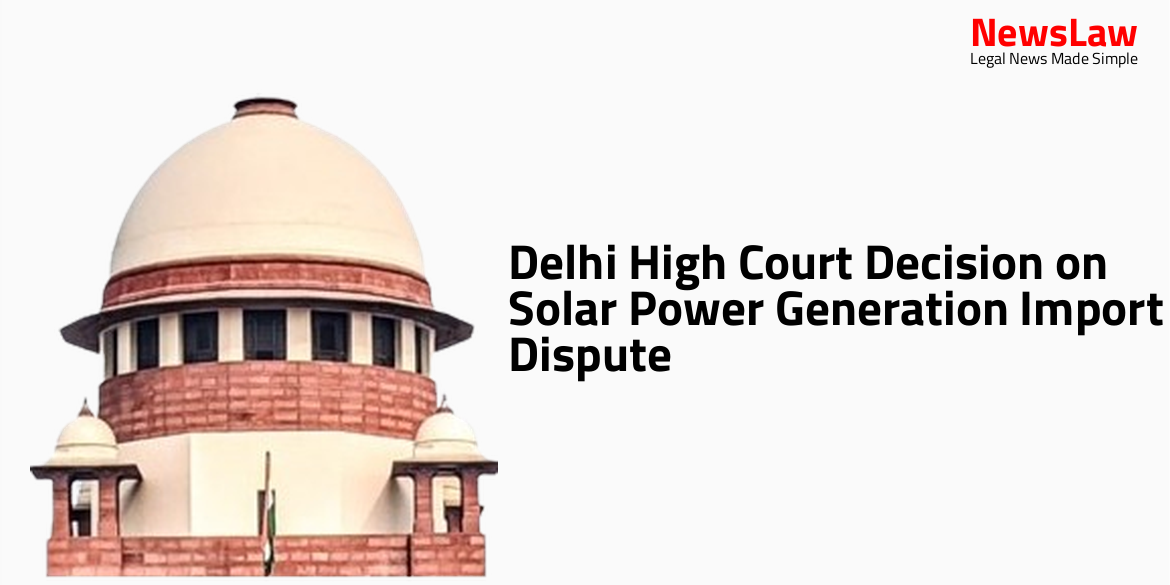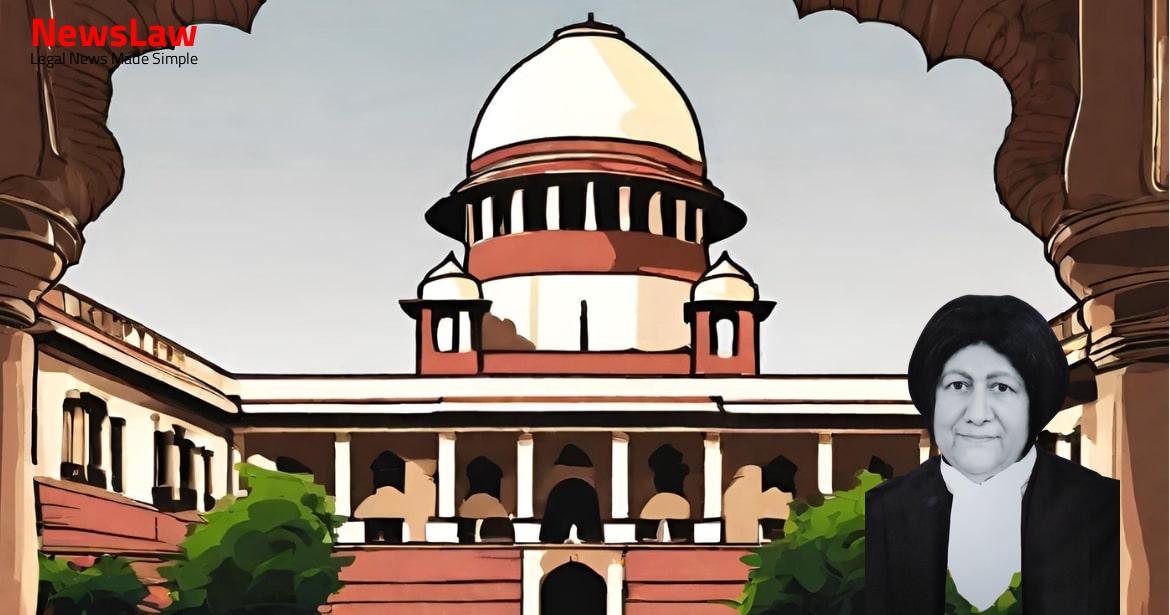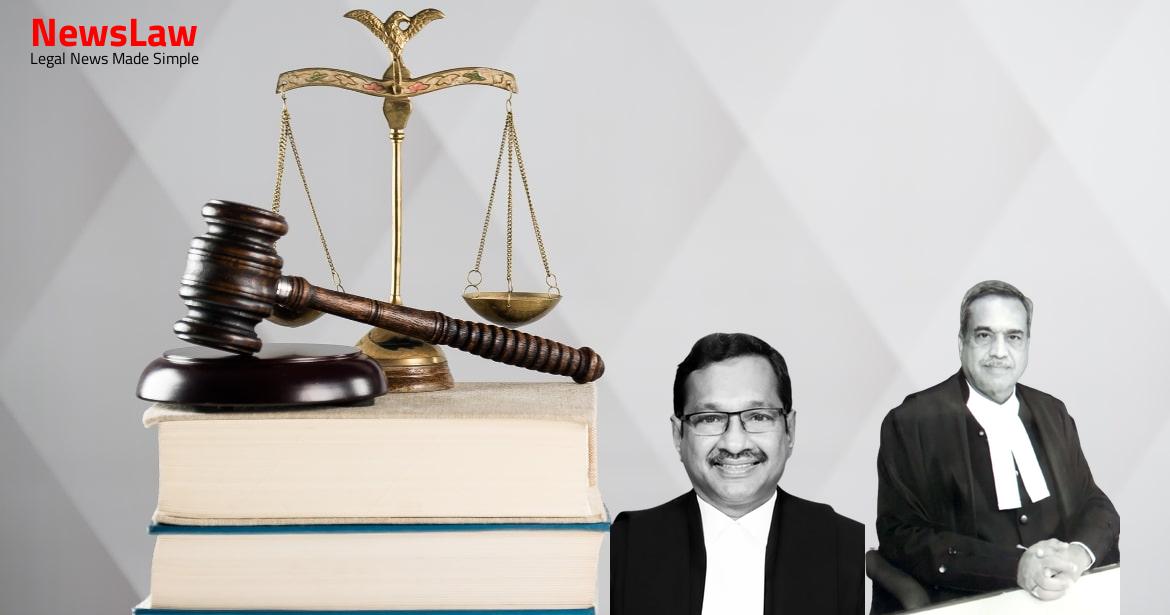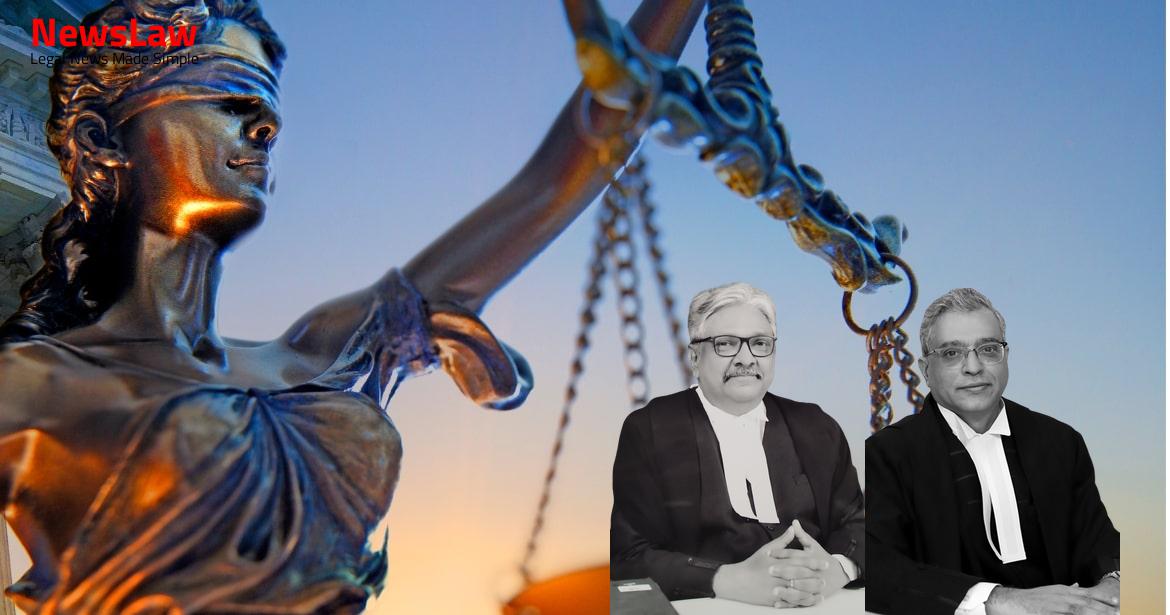In a significant legal development, the Delhi High Court has delivered a judgment on the dispute surrounding the import of solar power generation equipment. The case involves the petitioners who have challenged an Instruction issued under Section 151A of the Customs Act, 1962, impacting the warehousing of imported capital goods used in solar power generation. The respondents have issued Show Cause Notices calling for license cancellations, leading to a complex legal battle. Let’s delve into the details of this crucial case and the High Court’s ruling on the matter.
Facts
- The petitioners challenge the impugned Central Board of Indirect Taxes and Customs Instruction issued under Section 151A of the Customs Act, 1962.
- The Instruction pertains to warehousing of imported capital goods used in solar power generation.
- Petitioners assert the inapplicability of Manufacture and other Operations in Warehouse (No.2) Regulations, 2019.
- Various Show Cause Notices were issued based on the impugned Instruction, calling for explanations on potential license cancellations.
- W.P.(C) 12386/2022 challenges a letter requiring a provisional duty bond for release of imported goods.
- In W.P.(C) 10838/2022, petitioner contests the validity of a letter cancelling their warehouse license in addition to challenging the impugned Instruction.
- Reduction in imports seen after imposition of BCD in 2022-23
- Increase in imports of solar modules in 2023-24
- Data on import encapsulated in the provided chart
Issue
- Examining if the Circular constitutes revenue legislation for imposing excise duty.
- Determining if the suits must pertain to the recovery of immovable property in Greater Bombay.
- Analyzing the necessity to reproduce Section 37-B within the scope of Section 37B of the Act.
- Clarifying the application of the dominant purpose test in interpreting Section 14-A of the Act.
- Resolving the dispute regarding the interpretation of ‘in relation to’ in the context of dividend income from shares.
Arguments
- The petitioners have imported solar cells and panels as capital goods into India.
- The petitioners argue that the cancellation of their license was invalid as they were not given the opportunity to avail of certain benefits under the MOOWR Regulations.
- The petitioners contend that under the statutory scheme of the Act, upon importing goods chargeable to duty, an importer has the option to obtain clearance permission for home consumption or submit a BOE for warehousing.
- The Union Budget 2023-24 amended CTH 9801 to exclude solar power plants and projects from the purview of Project Imports.
- The Union Government aims to incentivize domestic manufacturing of solar cells in line with the Make in India and Atma Nirbhar Bharat initiatives.
- The petitioners challenge the stand taken by the Board which renders their license cancellation unsustainable.
- The grant of a license under MOOWR Regulations and the subsequent cancellation of the license are argued to be judicial acts based on specific procedures and requirements.
- The act of granting a MOOWR license is considered judicial and requires an inquiry procedure before arriving at a decision.
- The petitioners contest the allegation of attempting to circumvent duty by importing goods at a time when they were duty-exempt.
- The petitioners claim that the MOOWR Regulations and Section 65 do not exclude any particular industry from their operation, entitling them to the benefits as per the regulations.
- An authoritative determination on the scope of Section 65 read along with the MOOWR Regulations is requested by the petitioners for clarity on the issues at hand.
- Mr. Ghosh submitted that the apprehension of ACME and AVAADA is supported by the issuance of SCNs proposing to cancel their licenses.
- Mr. Ghosh questioned the interpretation of Sections 61 and 65 of the Act presented by the ASG and provided additional contentions.
- He argued that solar power generation should be considered a permissible activity under Section 65 of the Act.
- Mr. Ghosh emphasized that the statute does not exclude solar power generation from Section 65 and criticized the stand taken by the respondents.
- He highlighted the launching of schemes to reserve capacity for solar cells and modules manufactured domestically.
- The petitioners believe that the Act and MOOWR Regulations do not exclude solar power generation.
- Mr. Ghosh contended that quasi-judicial powers cannot be controlled by directives.
- He explained the distinction between ‘in manufacture of’ and ‘in relation to’ in terms of participation.
- Mr. Ghosh pointed out that a license in a similar case has already been canceled.
- It was argued that the impugned Instruction has an incorrect understanding of Sections 61 and 65 of the Act and the MOOWR Regulations.
- The meaning ascribed to Section 65 by the respondents was deemed erroneous by Mr. Ghosh and should be rejected.
Analysis
- Section 151A of the Act empowers the Board to issue orders, instructions, and directions to Customs officers for uniformity in the classification of goods and levy of duty.
- Cancellation of license can occur if the licensee contravenes Act provisions, rules, regulations, or breaches license conditions.
- Regulations 14 and 15 of the MOOWR deal with the removal of resultant goods for home consumption or export.
- MOOWR Regulations govern the operation of warehouses under specific sections of the Act.
- Section 65 of the Act allows manufacturing processes and operations in relation to goods in a warehouse with permission from Customs authorities.
- The Indian Renewables Statistics by IRENA emphasized India’s significant contribution to renewable energy capacity.
- The Supreme Court emphasized the literal rule of interpretation in legal cases.
- Quasi-judicial authorities should not be swayed by administrative influences in their judgments.
- Renewable energy sources like solar power are crucial for combatting pollution caused by fossil fuels in India.
- The legislative intent must be ascertained from clear statutory language, even if the consequences seem unjust.
- The role of courts is to interpret and apply the law, not to change it based on personal views of justice.
- The clarity and unambiguous nature of statutory provisions dictate the interpretation and application by the courts.
- Courts should not amend laws under the guise of interpretation but adhere to the intended legislative purpose.
- The courts must give effect to clear legislative language, even if it leads to results that seem unfair or harsh.
- Interpreting statutes based on their plain meaning does not permit judges to amend laws based on their sense of justice.
- The intention of Parliament should be discerned from the language used in statutory provisions.
- The court cannot recreate or exclude a category of activity in Section 65 based on its impact or working experience.
- The demand for a provisional bond for the release of goods was raised as an additional issue.
- The court cannot use principles of purposive interpretation to correct perceived anomalies arising from solar power generation impacting local generators or the ‘level playing field’.
- Policy aspects cannot be the basis for the court to reconstruct a statutory provision.
- The court should not introduce conditions of ineligibility under the guise of statutory interpretation.
Decision
- The Instruction of the Board dated 09 July 2022 mandating review of existing licences and follow-up action is quashed.
- Detailed orders were passed on 04 August 2023 addressing the issue and considering an Application for Directions.
- The operation of the impugned Show Cause Notice was stayed during the pendency of the writ petition and confirmed on 26 August 2022.
- The writ petitions are allowed based on the aforementioned reasons.
- No further observations are deemed necessary.
- An amendment application was moved by the petitioner to challenge the Show Cause Notice.
- W.P.(C) 12386/2022 shall stand final determination.
- The respective parties are directed to proceed based on the issued directions.
Case Title: AVAADA SUNRAYS ENERGY PRIVATE LIMITED Vs. CENTRAL BOARD OF INDIRECT TAXES AND CUSTOMS & ANR. (2024:DHC:3615-DB)
Case Number: W.P.(C)-10840/2022



